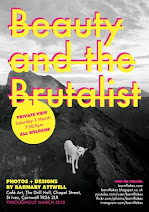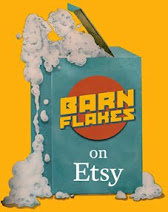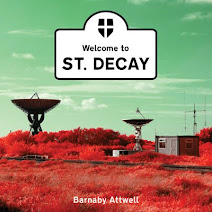Extracts from another (see
here and
here) abandoned 'novel', circa. 1994.
re-frac-to-ry adj1 : resisting control or authority2 a : resistant to treatment or cure b : unresponsive to stimulus c : IMMUNE, INSUSCEPTIBLE3 : difficult to fuse, corrode, or draw outHe told me he remembers swimming in a flooded gold mine in Borneo during World War II. It still sounds like the most exciting thing I've ever heard.
Empty, sordid discussions in template, tepid surroundings. Used crates of Coca-Cola litter the huge warehouse. Pigeon shit and pigeons. A lot of dark wetness. A purpose-burst water pipe. A couple of torches, a couple of people. No batteries. Disused but used. Manuscripts for post-modern poets. Statues with sliced-off faces (then painted over). Two hermits not kermits. Concise, compressed people. Unable, though, to perform the tasks society asks them to. So they occasionally play blackjack but both pretend every card is a blackjack and can get away with it, as it’s so dark. They lie, though two out of fifty-two cards will indeed be blackjacks. In these instances they are not lying. They lie about twos, aces and others and the probability of lies is less still. These games are pointless or seem pointless. Hey, they pass the time. What they look like no one knows (no one knows about them). Not because of the darkness but who cares at all? They’re kept sane and the same. They get hot then cold then hot then cold just like everybody else. No teeth, though, too much Coke. OTT. Over dose. And it rots the lining of your stomach. Coca-Cola. Oh dear. No Coke left either, though they wouldn’t know that.
These lads haven’t been inside all their lives, of course. No, they did it by choice. And even if they have got into a slight rut at the moment, they’re still happy, but a different, hopeless, depressing kind of happiness. Hey, for all we know they want to do fuck all just so their lives will go slower, seem longer. They don’t have much conception or use for time which is kinda man-made. Then again so are playing cards. Time passes nicely.
There’s a constant supply of poisoned water trickling out from the burst water pipe. A step up from Coca-Cola anyway. They mostly eat raw pigeons and pigeon shit. Rats with wings. The pigeons get in, and if they’re lucky, out, through a small black hole at the top of the building in one of the corners. Their wings echo in the silence. They kill them by throwing up empty cans of Coke. Torn open so as to be sharp and dangerous. Yes, it’s a fairly unhealthy way of life. They smoke cigarettes too. Well, they can’t light them cos they have no light so it can’t be too unhealthy. They’ve had the same pack of ten Marlboros for two years. There’s still ten there. The filters are a touch soggy now, that’s all.
I love therefore I hate... The dark rain caresses, almost masturbates, the almost mutilated (in mind already), (the) thin, long, dead male body in the road or is it more natural in the countryside?
The cold abstract beauty of Le Samourai: 'I like it when you come round because you need me.' It was on TV at the time. Ha. 'I’ve never worn a moustache.' Precise and cold. Clinical. It’s how life is at the moment.
"What do you think about, Costello?"
"I never think." (Le Samourai, Jean-Pierre Melville, France, 1967)
Before, years before, Max and Ralph go back to Ralph’s house, after some magic mushrooms. Things different, off license a space station, floor moving, teenage girls are aliens, can’t walk properly, laughing like a hyena. This is just after he’s recycled all his magazines and his past, a quite scary and good feeling, feeling freer, naked, after he’s talked to her for over an hour on the phone. Shit, he wishes he knew where he is what he wants what he wants to do, to say. After an embarrassing party full of horrible embarrassing Australians – Trish the Dish being the centre piece. Max feels awkward, doesn’t know what to do, for the first time in a long time. After this, they’re home. They go into the living room where Ralph’s dad, David, has a woman on him, laughing, her hair and face in his lap, she tosses her head back as they come in (she’s quite oldish, orange long straight hair, but could well be Judy Davis from Naked Lunch). David, sitting there, watching TV, cat beside him, cup of tea, relaxed, chatting to Ralph and Max as if there was not a woman perched on his lap. Then, when Max leaves, lots and lots of insects on the outside walls of the house (it’s an alleyway) – two narrow white tall walls now with lights, a little passageway leading to main street. Gets home and doesn’t know who he is. He’s an alien. He watches TV. Ha.
Top and bottom are different, yet the same. The same because they are so different to the mid, the norm, the middle which is where most of us are. So they’re both so far apart from this mid, so unimaginable that they’re both similar in that respect.
You get a telephone call from a girl you like and who likes you. You’re about to go for a bike ride with someone else, you say. (It’s raining and muddy). Can she come over afterwards, she asks. You tell her she can, you’d like to see her. You phone her when you get back. You’re tired, muddy, cold and your legs are killing you, having not cycled for months. You feel refreshed, though. You wake her up, she fell asleep reading Wuthering Heights. She says she’s tired, drowsy, and she does sound like it, she sounds like her mother or a witch. Different, anyway. She needs an hour or so to wake up, she tells you, then she’ll be at your house. An hour or so later she phones you again to say she’s sorry, she’s still feeling tired and drowsy and won’t be coming over. She asks you over, it’s not that far, a short bus ride, but you lie and say you feel the same way (tired). A little while later you both fall asleep. When you wake up you wonder about the point of anything.
On the way home: A couple looking dead blue sitting down together as one, part of the same thing in a car as part of the car (a blue 1970s SAAB V6), in fact, which is also blue in a ghostly way. They were in the blue darkness, lonely and dead. Then: clichéd newspapers blowing in the wind but so dangerously and sharply, wrappingly, kinda like doves or birds in shape somehow. The moth leaves in the black trees. The mad drunk kicking the phone-box that you’re in, scared and silent. Show someone you love them by setting them free / And Molly being nice to me.
Max said something about if you can see someone’s face in your mind then you don't need to see them again because your memory of them is complete, there’s no mystery, no point in seeing them again. If the memory of the face has faded, you need to see them again, there’s a desire to, because something of her is missing from your mind and for a reason.
Life, around this time:
Max: 'What do you expect out of life?'
Ralph: 'Something I'm not expecting.'
He needs to add some life to his spice.
She's reading a book in a library, just casually flicking through the pages. A man's heavy footsteps approach her. She whispers to him: 'Come outside, I'm going to kill myself'. She walks out of the library and into a lift. A man in the lift with her tries to pull down her trousers (she's wearing trousers). She whispers to him: 'Don't do that, I'm too vulnerable'. The man asks: 'Ground?' DING – DOORS OPEN. She runs out of the lift and into a landscape of whistling reeds and rustling leaves. She runs through the leaves and jumps into the bath, splashing around in it.
EXT. NIGHT. RAIN.
She stands just outside the house, in the rain. But she has a blue and white polka dot umbrella. Only her eyes are not in shadow. It’s like a film noir. The light in her eyes is from the open door of the house where the man stands. He’s standing on the step and is quite tall, so she looks up at him and asks if he’s sad. He says he’s not, not really, the same as usual. She leaves, looking sad but beautiful with her umbrella. Later, he goes out without an umbrella, hole in one shoe, half to find her, half to find the girl in the phone box. He finds neither, so goes home.




























